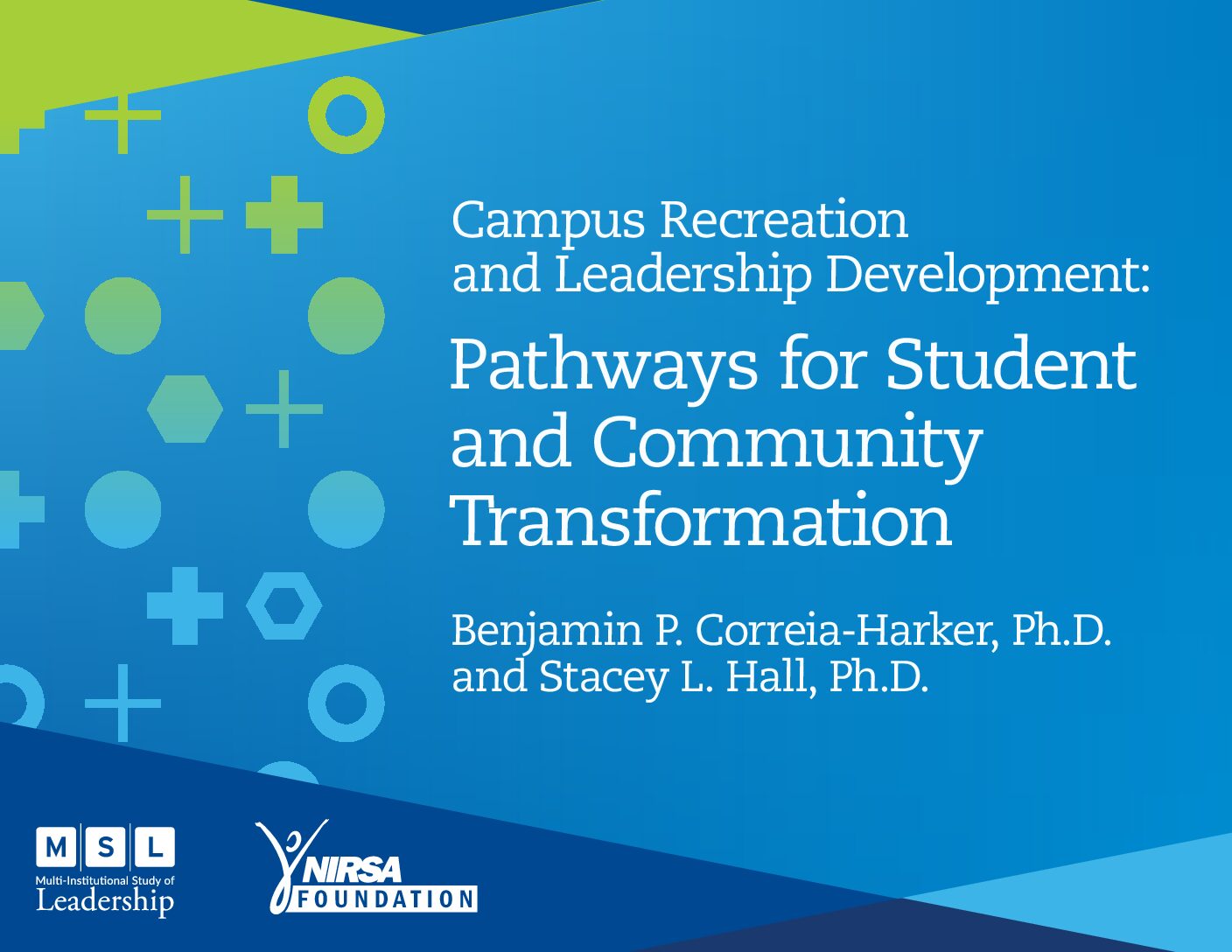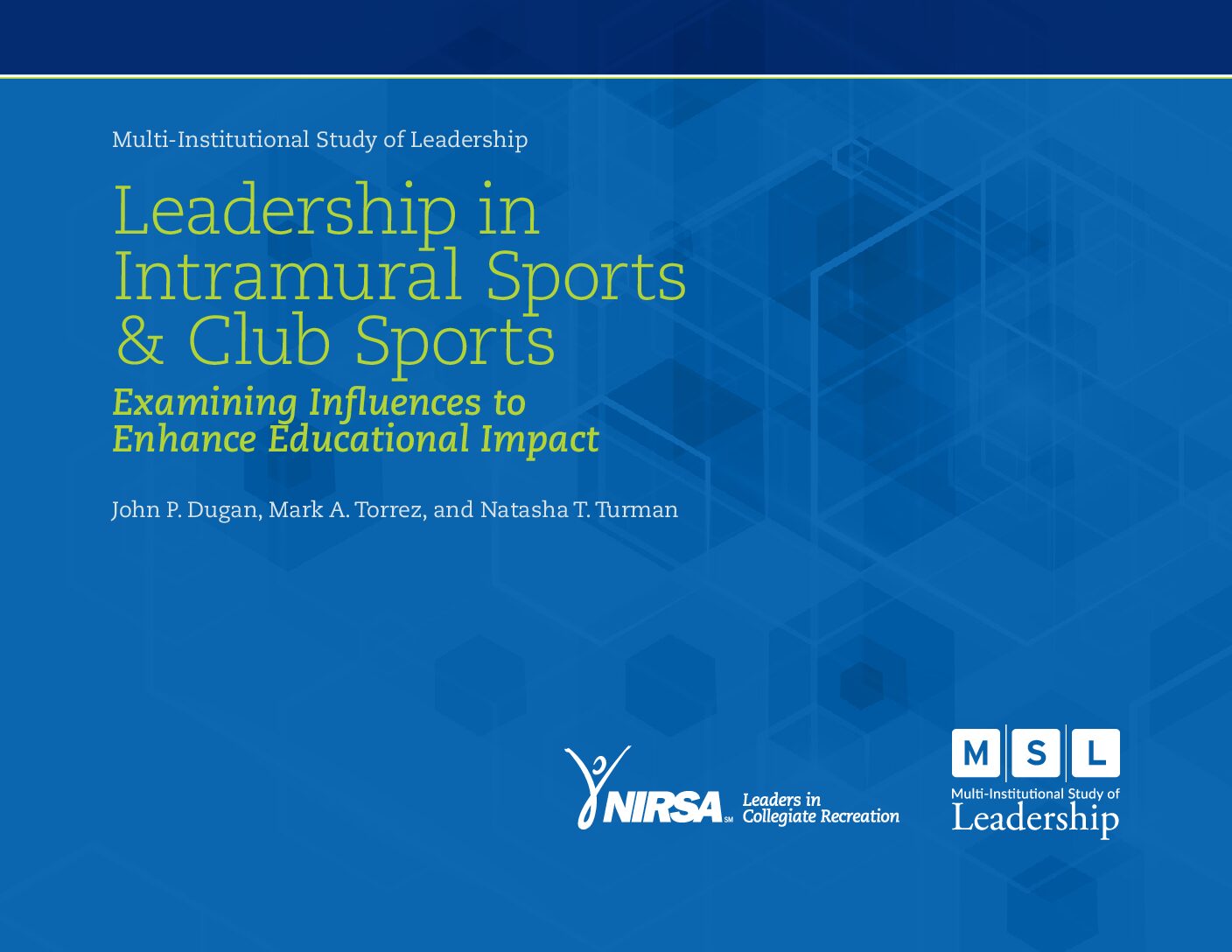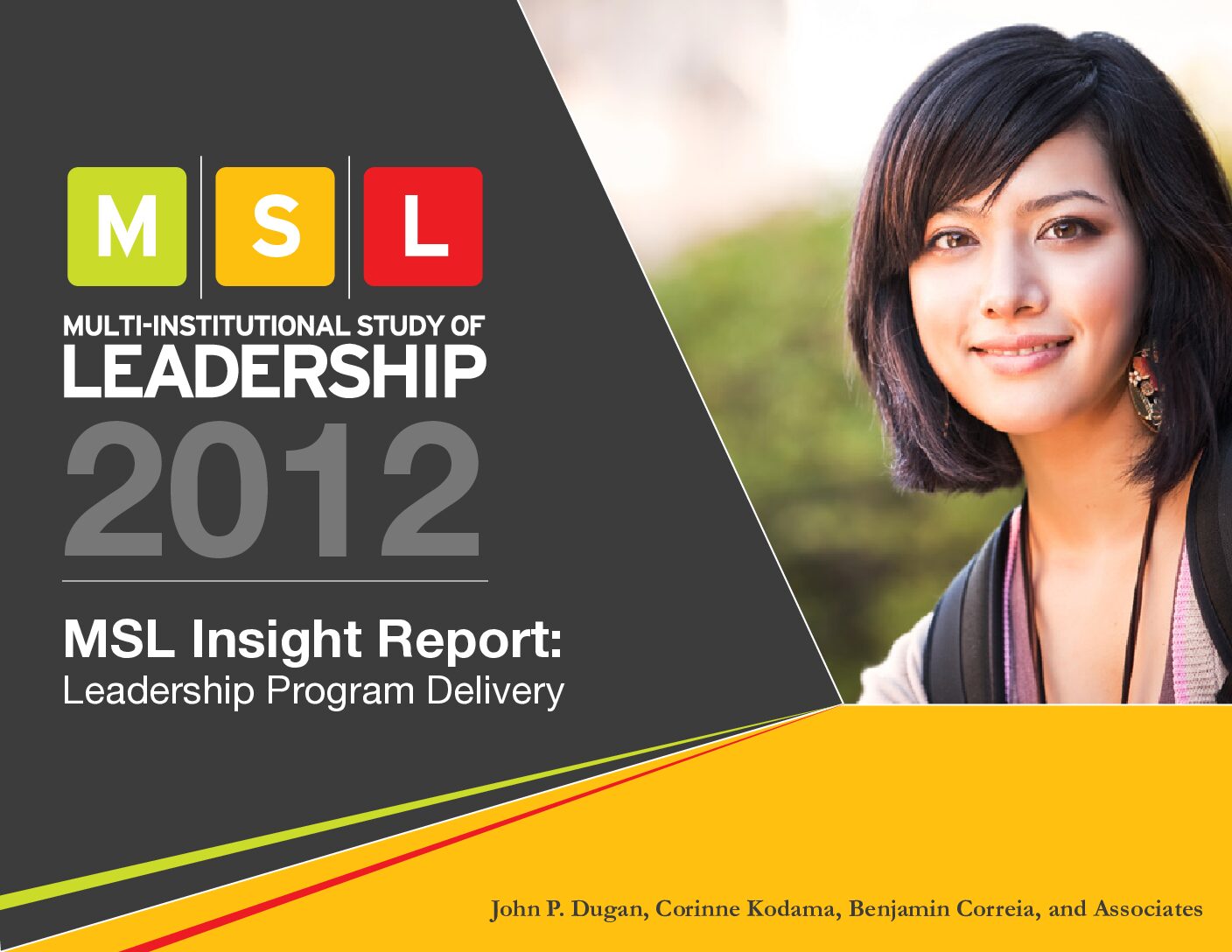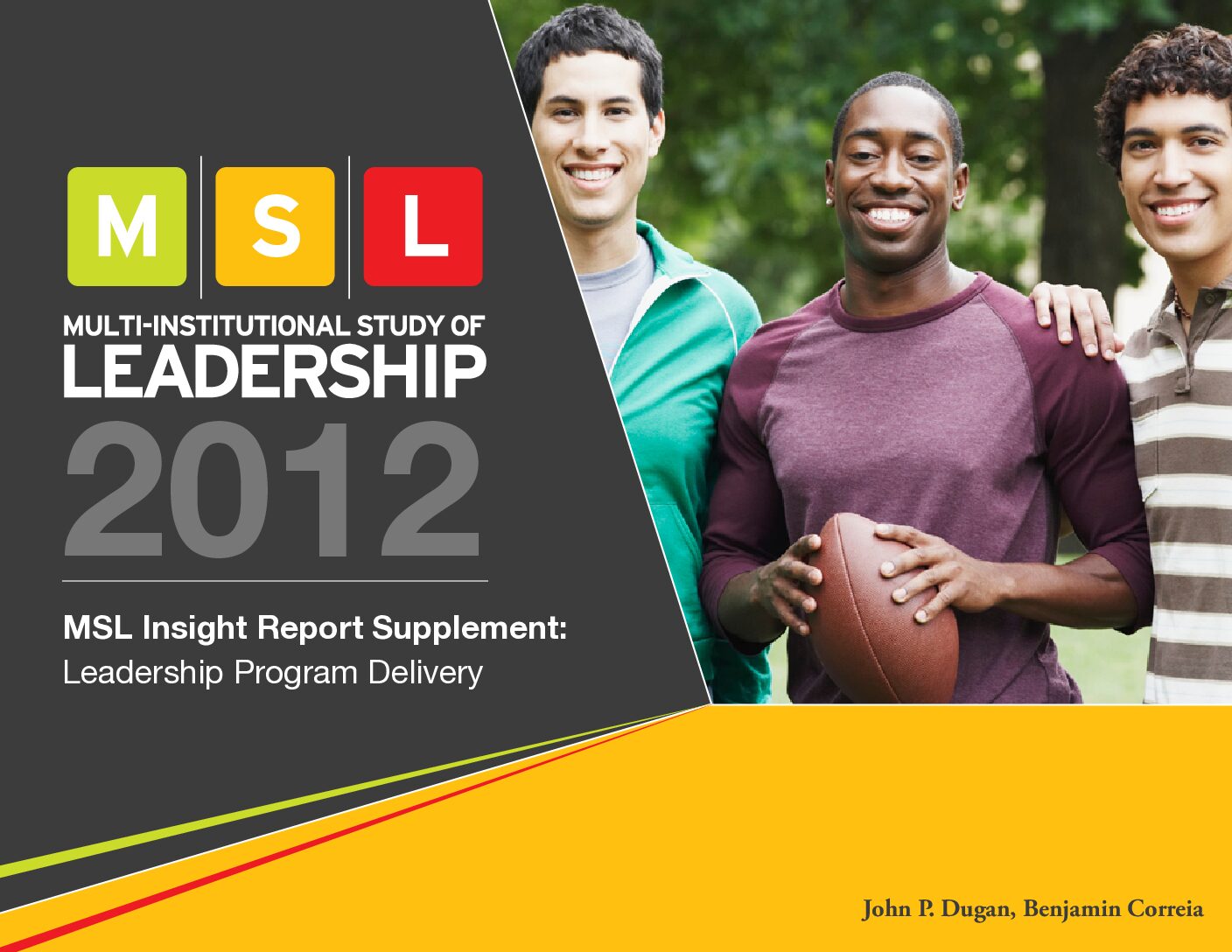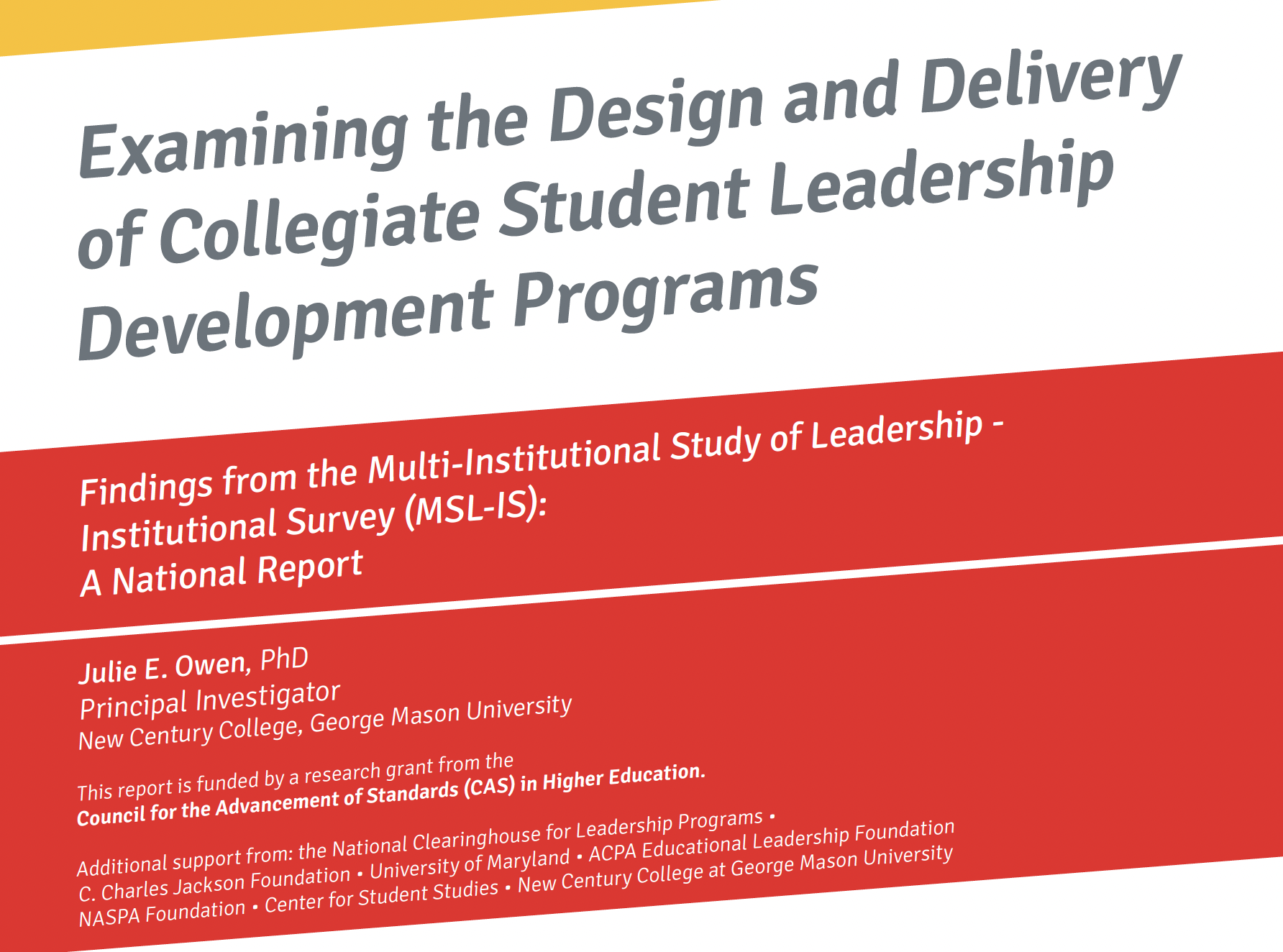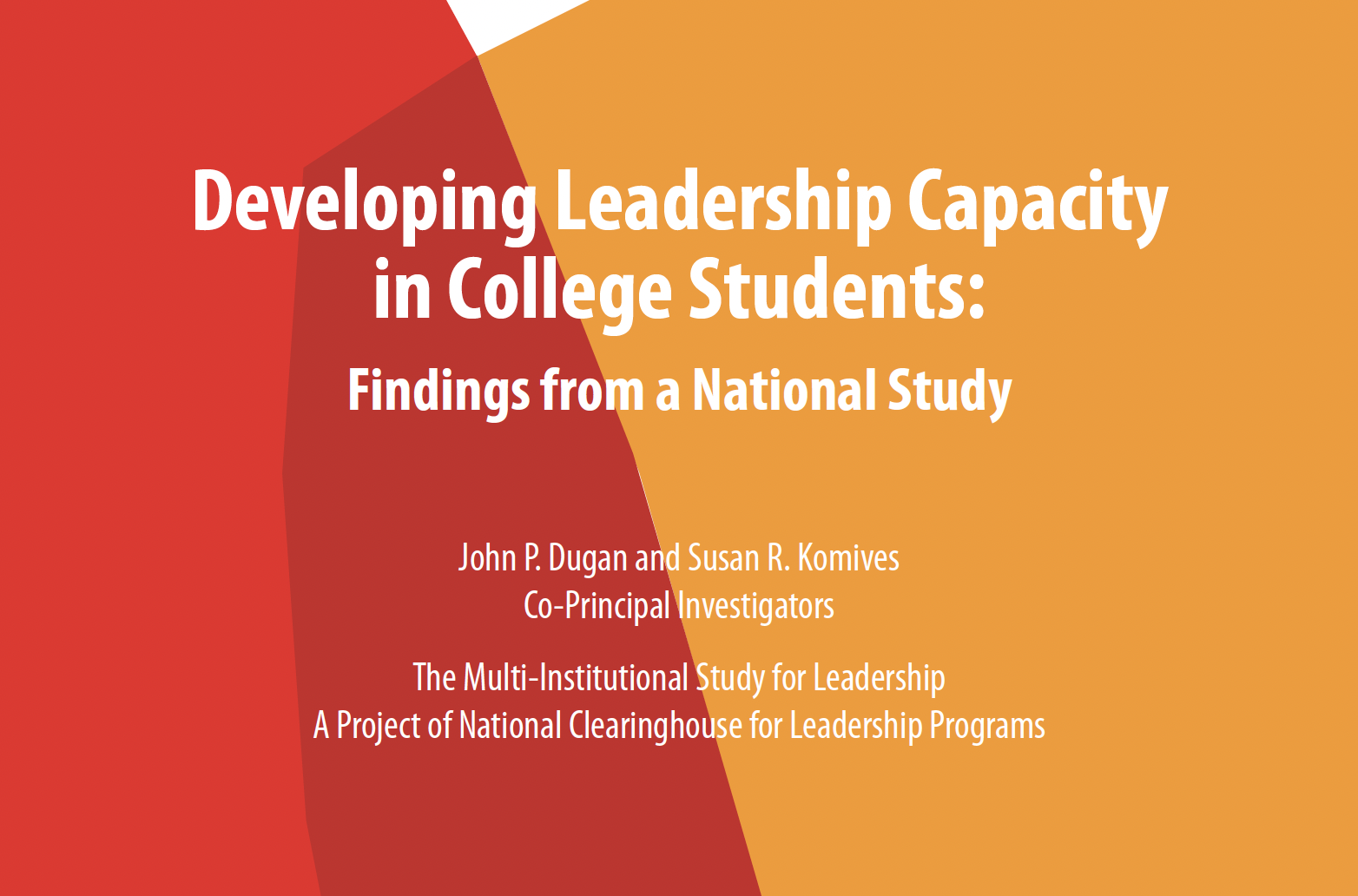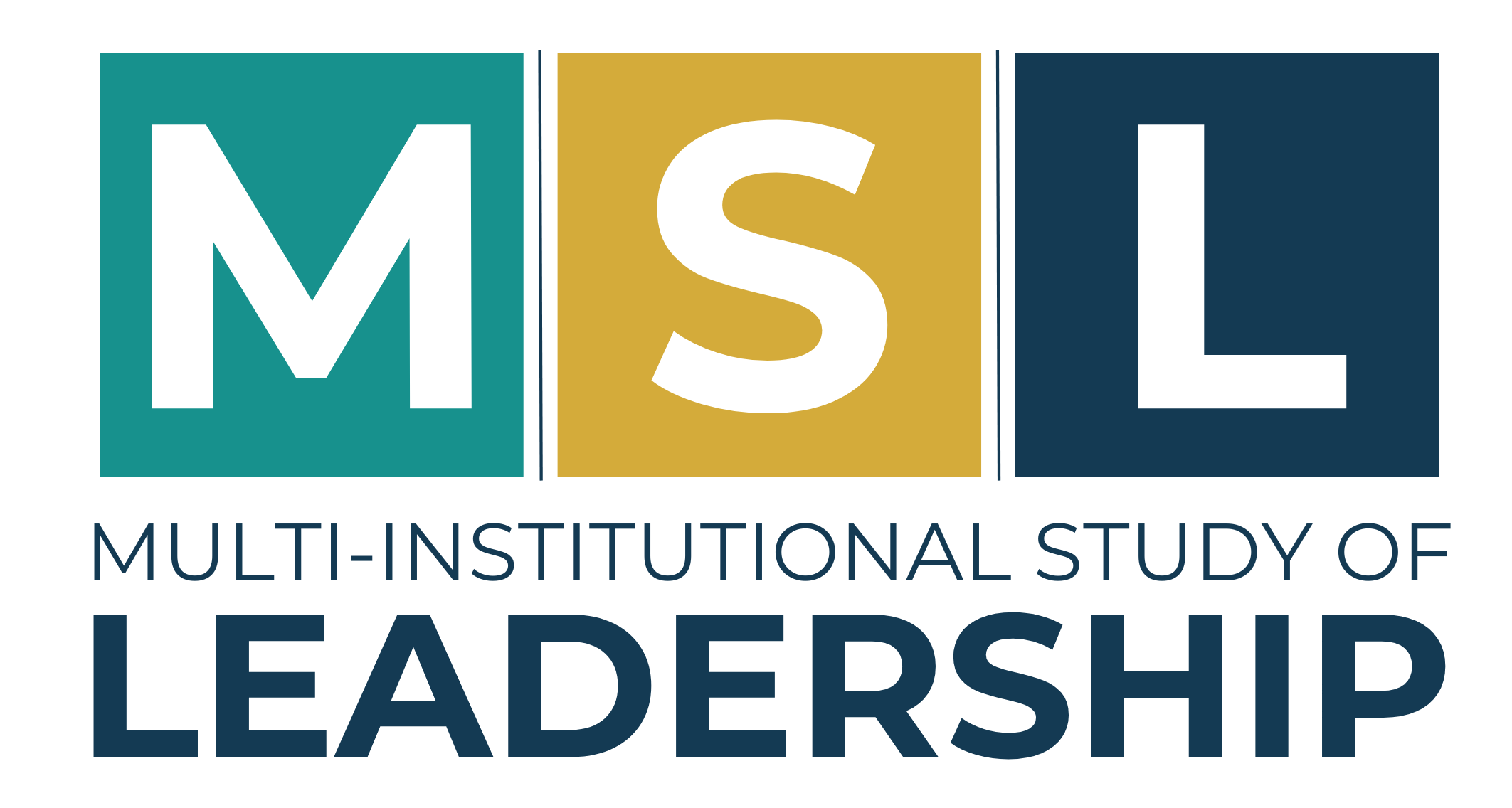
MSL Publications
In an effort to promote the continual enhancement of leadership practice, the MSL team makes information available through national reports produced by our core research team, research articles produced by or in collaboration with our research team, and theses and dissertations that utilize MSL data.
National Reports
Research Articles
Theses & Dissertations
National Reports
Correia-Harker, B. P. & Hall, S. L. (2019). Campus Recreation and Leadership Development: Pathways for Student and Community Transformation. Corvallis, OR: NIRSA.
Dugan, J. P., Kodama, C., Correia, B., & Associates. (2013). Multi-Institutional Study of Leadership insight report: Leadership program delivery. College Park, MD: National Clearinghouse for Leadership Programs.
Dugan, J. P., & Correia, B. (2014). MSL insight report supplement: Leadership program delivery. College Park, MD: National Clearinghouse for Leadership Programs.
NOTE: This document was prepared for schools that participated in the 2012 cycle of the MSL and supplements the general findings presented in the full 2012 MSL Insight Report: Leadership Program Delivery. This is an interactive document. In order to experience all of its features, please download to your computer and open it with Adobe Reader (do not view in your browser).
Owen, J. E. (2012). Findings from the Multi-Institutional Study of Leadership institutional survey: A national report. College Park, MD: National Clearinghouse for Leadership Programs.
Research Articles
- Peer-Reviewed Publications
- Concepts & Connections
- Publications Using the SRLS–R2 Instrument
- Other Articles
Campbell, C. M., Smith, M., Dugan, J. P., & Komives, S. R. (2012). Mentors and college student leadership outcomes: The importance of position and process. Review of Higher Education, 35(4), 595-625.
Correia-Harker, B. P., & Dugan, J. P. (2020). Beyond knowledge and skills: Exploring leadership motivation as a critical construct for student leadership development. Journal of College Student Development, 61(3), 299-316. DOI: 10.1353/csd.2020.0029
Dugan, J. P. (2008). Exploring relationships between fraternity and sorority membership and socially responsible leadership. Oracle: The Research Journal of the Association of Fraternity Advisors, 3(2), 16-25.
Dugan, J. P. (2015). The measurement of socially responsible leadership: Considerations in establishing psychometric rigor [La misurazione della leadership socialmente responsabile: Considerazioni sulla definizione del rigore psicometrico]. Journal of Educational, Cultural, and Psychological Studies, 12, 23-42.
Dugan, J. P., Bohle, C. W., Gebhardt, M., Hofert, M., Wilk, E., & Cooney, M. A. (2011). Influences of leadership program participation on students’ capacities for socially responsible leadership. Journal of Student Affairs Research and Practice, 48(1), 65-84.
Dugan, J. P., Bohle, C. W., Woelker, L., & Cooney, M. (2014). The role of social perspective-taking in developing students’ leadership capacities. Journal of Student Affairs Research and Practice, 51(1), 1-15.
Dugan, J. P., Fath, K. Q., Howes, S. D., Lavelle, K. R., & Polanin, J. R. (2013). Developing the leadership capacity and leader efficacy of college women in science, technology, engineering, and math fields. Journal of Leadership Studies, 7(3), 6-23.
Dugan, J. P., Garland, J. L., Jacoby, B., & Gasiorski, A. (2008). Understanding commuter student self-efficacy for leadership: A within-group analysis. NASPA Journal, 45, 282-310.
Dugan, J. P., Kodama, C. M., & Gebhardt, M. C. (2012). Race and leadership development among college students: The additive value of collective racial esteem. Journal of Diversity in Higher Education, 5(3), 174-189.
Dugan, J. P., & Komives, S. R. (2010). Influences on college students’ capacity for socially responsible leadership. Journal of College Student Development, 51(5), 525-549.
Dugan, J. P., Komives, S. R., & Segar, T. C. (2008). College student capacity for socially responsible leadership: Understanding norms and influences of race, gender, and sexual orientation. NASPA Journal, 45(4), 475-500.
Dugan, J. P., Kusel, M. L., & Simounet, D. M. (2012). Transgender college students: An exploratory study of perceptions engagement, and educational outcomes. Journal of College Student Development, 53(3), 719-736.
Dugan, J. P., Rosseti, Morosini, A. M., & Beazley, M. R. (2011). Cultural transferability of socially responsible leadership: Findings from the United States and Mexico. Journal of College Student Development, 52(4), 456-474.
Dugan, J. P., Turman, N. T., & Torrez, M. A. (2015). When recreation is more than just sport: Advancing the leadership development of students in intramurals and club sports. Recreational Sports Journal, 39, 37-48.
Dugan, J. P., & Yurman, L. (2011). Commonalities and differences among lesbian, gay, and bisexual college students: Considerations for research and practice. Journal of College Student Development, 52(2), 201-216.
Early, S. L. (2017). Race and gender mentor-protégé pairings of resident assistants: An exploration on leadership capacity. Journal of Leadership Educators, 16(1), 1-17. DOI: 10.12806/V16/I1/R1
Early, S. L. (2016). An examination of mentoring relationships and leadership capacity in resident assistants. The Journal of College and University Student Housing, 42(3), 52-65.
Haber, P. (2012). Perceptions of leadership: College students’ understandings of the concept of leadership and differences by gender, race, and age. Journal of Leadership Education, 11(2), 26-51.
Haber, P., & Komives, S. R. (2009). Predicting the individual values of the social change model of leadership development: The role of college students’ leadership and involvement experiences. Journal of Leadership Educators, 7(3), 133-166.
Johnson, M. R. (2014). Predictors of college student engagement in social change behaviors. Journal of College & Character, 15(3), 149-163. DOI:10.1515/jcc-2014-0019
Johnson, M. R. (2015). Building college students’ civic identity: The role of socio-cultural issues discussions and social perspective-taking. Journal of College Student Development, 56, 687-704.
Johnson, M. R., Dugan, J. P., & Soria, K. M. (2017). “Try to see it my way”: What influences social perspective taking among college students? Journal of College Student Development, 58(7), 1035-1054. DOI: 10.1353/csd.2017.0082
Johnson, M. R., Johnson, E. L., & Dugan, J. P. (2015). Developing socially responsible leadership and social perspective-taking in fraternities and sororities: Findings from a national study. Oracle, 10(1), 1-18.
Johnson, M. R., Schuneman, M., & McClure, S. (2022). Comparing the effects of COVID-19 on fraternity & sorority members and unaffiliated college students. Oracle: The Research Journal of the Association of Fraternity/Sorority Advisors, 17(1), 17-30. DOI: 10.25774/ww8n-p985
Kodama, C. M., & Dugan, J. P. (2013). Leveraging leadership efficacy for college students: Disaggregating data to examine unique predictors by race. Equity & Excellence in Education, 46(2), 184-201.
Leupold, C., Lopina, E., & Skloot, E. (2020). An examination of leadership development and other experiential activities on student resilience and leadership efficacy. Journal of Leadership Education, 19(1), 53-64. doi:10.12806/V19/I1/R1
Lewis, J.S. (2020). Reconsidering the effects of work on college student leadership development: An empirical perspective. Journal of College Student Development, 61(5), 539-557. doi:10.1353/csd.2020.0054
Martinez, N., Sowcik, M. J., & Bunch, J. C. (2020). The impact of leadership education and co-curricular involvement on the development of socially responsible leadership outcomes in undergraduate students: An exploratory study. Journal of Leadership Education, 19(3), 32–43.
Oxendine, S. D., Taub, D. J., & Cain, E. J. (2020). Factors related to Native American students’ perceptions of campus culture. Journal of College Student Development, 61(3), 267-280. doi:10.1353/csd.2020.027
Shalka, T. R., & Jones, S. R. (2010). Differences in self-awareness related measures among culturally based fraternity, social fraternity, and non-affiliated college men. Oracle: The Research Journal of the Association of Fraternity/Sorority Advisors, 5(1), 1-11.
Shalka, T. R. (2017). The impact of mentorship on leadership development outcomes of international students. Journal of Diversity in Higher Education, 10(2), 136–148.
Shalka, T. R., Corcoran, C., & Magee, B.T. (2019). Mentors that matter: international student leadership development and mentor roles. Journal of International Students, 9(1), 97–110.
Soria, K., Nobbe, J., & Fink, A. (2013). Examining the intersections between undergraduates’ engagement in community service and development of socially responsible leadership. Journal of Leadership Education,12(1), 117–139.
Soria, K. M., Werner, L., & Nath, C. (2019). Leadership experiences and perspective taking among college students. Journal of Student Affairs Research and Practice, 56(2), 138-152. DOI: 10.1080/19496591.2018.1490309
Stonecipher, P. (2012). The development of the leader and the spirit: Integrating the concepts toward meaning-making. Journal of Leadership Education, 11(2), 88-101.
Stephens, C.M. & Rosch, D.M. (2015) Building leaders: A national examination of leadership capacities within engineering undergraduate students. International Journal of Engineering Education, 31(4), 1-12.
Whitney, R., & Meents-DeCaigny, E. (2014). Examining the influence of campus leadership programs at a Catholic university. Journal of Catholic Higher Education, 33(2), 207-235.
Between 2006–2008, Concepts and Connections (a publication of the National Clearinghouse for Leadership Programs) published a series of four issues focusing on MSL findings and related features. Several articles from this series are available for download below:
Volume 15 (1)MSL and Assessment (.pdf)
Crawford, S. (2006). Hardening the science of web–based surveys in assessment research. Concepts and Connections, 15(1), 14–15.
Dugan, J. P. & Komives, S. R. (2006). Select descriptive findings from the multi–institutional study of leadership. Concepts and Connections, 15(1), 16–18.
Hundley, E. (2006). The MSL at the institutional level: UMBC’s team approach. Concepts and Connections, 15(1), 13–14.
Komives, S. R., Dugan, J. P., & Segar, T. C. (2006). The multi–institutional study of leadership: Understanding the project. Concepts and Connections, 15(1), 5–7.
Lucia, M., & Thomson, G. (2006). UC Berkeley’s experience with the multi–institutional study of leadership. Concepts and Connections, 15(1), 11–12.
Wagner, W. (2006). The social change model of leadership: A brief overview. Concepts and Connections, 15(1), 8–10.
Volume 15 (2) MSL and Identity Findings
Calizo, L. H., Cilente, K., & Komives, S. R. (2007). A look at gender and the multi–institutional study of leadership. Concepts and Connections, 15(2), 7–9.
Dugan, J. P., Jacoby, B., Gasiorski, A., Jones, J.R., & Kim, J. C. (2007). Examining race and leadership: Emerging themes. Concepts and Connections, 15(2), 13–15.
Martinez, K. Y., Ostick, D. T., Komives, S. R., & Dugan, J. P. (2007). Lesbian, gay, and bisexual leadership and self–efficacy: Findings from the multi–institutional study of leadership. Concepts and Connections, 15(2), 10–12.
Volume 15 (3)MSL and Teaching Leadership (.pdf)
Dugan, J. P., & Haber, P. (2007). Examining the influences of formal leadership programs on student educational gains. Concepts and Connections, 15(3), 7–10.
Owen, J. E., & Komives, S. R. (2007.) Does credit matter? Examining the effects of curricular leadership programs. Concepts and Connections, 15(3), 4–6.
Rosch, D. (2007). Analyzing single–institution results on the multi–institutional study of leadership (MSL). Concepts and Connections, 15(3), 15–16.
Volume 15 (4) MSL and Co–Curricular Leadership Experiences (.pdf)
Dugan, J. P. (2008). Involvement in student clubs and organizations matters. Concepts and Connections, 15(4), 11–13.
Ellsworth, C., & Admundson, A. (2008). Fraternity and sorority residents and the multi–institutional study of leadership. Concepts and Connections, 15(4), 6, 16.
Elston, D. E. (2008). Georgia State University’s experience with the multi–institutional study of leadership. Concepts and Connections, 15(4), 13–14.
Fox, K. F., Smist, J. A., & Komives, S. R. (2008). Service matters: Reviewing gender implications. Concepts and Connections, 15(4), 5–6.
Jabaji, R., Slife, N., Komives, S. R., & Dugan, J. P. (2008). Mentoring relationships matter in developing student leadership. Concepts and Connections, 15(4), 7–8.
Roberts, D. C., & Beckett, A. (2008). Understanding the role of mentors in leadership learning. Concepts and Connections, 15(4), 14–15.
Segar, T. C., Hershey, K., & Dugan, J. P. (2008). Socio–cultural discussions: The power of engaging across difference. Concepts and Connections, 15(4), 9–10.
Martinez, M. T., Gehrke, S. J., Komives, S. R., & Dugan, J. P. (2007). Student programmers and leadership development: Select findings from the multi-institutional study of leadership. NACA Campus Activities Programming, 40(1). 46-49.
Theses & Dissertations
Anderson, M. (2012). The leader development of college students who participate in different levels of sport (Doctoral dissertation).
Anthony, M. D. (2010). The influence of collective racial esteem on the involvement of African American undergraduate males attending public four-year institutions of higher education (Doctoral dissertation).
Atkins, P. B. (2019). An examination of efficacy and resilience in college students: Influences on socially responsible leadership (Doctoral Dissertation). Retrieved from https://digitalcommons.latech.edu/cgi/viewcontent.cgi?article=1833&context=dissertations
Bonnet, J. (2008). The contributions of mandatory service for civic engagement: A study of community services participation and citizenship among undergraduates (Master’s thesis).
Brown, A. (2010). Quantitative study of leadership self-efficacy and peer mentorship at the University of Wisconsin-La Crosse (Master’s thesis). Retrieved from http://minds.wisconsin.edu/handle/1793/46610
Chowdhry, C. (2010). Undergraduate college students’ civic responsibility and social change behaviors in the context of student organizations (Master’s thesis).
Dowiak. S. M. (2016). Fraternity at the crossroads (Doctoral Dissertation).
Dugan, J. P. (2008). Group involvement experiences in college: Identifying a thematic taxonomy (Doctoral dissertation). Retrieved from http://hdl.handle.net/1903/8045
Durham Hynes, S. L. (2008). Perceptions of the capacity for change as a component of leadership development as reported by select populations of college students: Implications for college student leadership development (Doctoral dissertation). Retrieved from Dissertation and Theses Database. (UMI No. 3370691)
Early, S. L. (2014). An Examination of Mentoring Relationships and Leadership Capacity in Resident Assistants (Doctoral dissertation). Retrieved from ProQuest Dissertations and Theses. Retrieved from https://etd.ohiolink.edu/ap/10?0::NO:10:P10_ACCESSION_NUM:bgsu1387541026 (Accession Order No. bgsu1387541026)
Enlow, G. K. (2014). Student leadership development: The influence of mentor relationship (Doctoral dissertation).
Fincher, J. (2008). Leadership self efficacy for college students with a learning disability (Master’s thesis). Retrieved from http://hdl.handle.net/1903/8210
Garland, J. L. (2010). Removing the college involvement “research asterisk”: Identifying and rethinking predictors of American Indian college student involvement (Doctoral dissertation). Retrieved from http://hdl.handle.net/1903/10781
Gasiorski, A. L. (2009). Who serves in college?: Exploring the relationship between background college environments, and college community service participation (Doctoral dissertation). Retrieved from http://hdl.handle.net/1903/9191
Gerhardt, C. B. (2008). The social change model of leadership development: Differences in leadership development by levels of student involvement with various university student groups (Doctoral dissertation). Retrieved from Dissertations and Theses database. (UMI No. 3340075)
Gleason, M. C. (2012). Mentoring influence on socially responsible leadership capacity based on institutional Carnegie Classification (Doctoral dissertation).
Haber, P. (2011). Perceptions of leadership: An analysis of college students’ understandings of the concept of leadership (Doctoral dissertation).
Hershey, K. (2007). Engaging with diversity: Examining the relationships between undergraduate students’ frequency of diversity discussions and their appreciation of diversity and self-awareness (Master’s thesis).
Hogendorp, M. B. (2012). The relationship of student involvement in political organizations to self-reported capacities for socially responsible leadership (Doctoral dissertation). Retrieved from https://www.ideals.illinois.edu/handle/2142/31102
Hurley, P. T. (2016). I am because we are: Exploring the relationships between mentorship, involvement in LGBTQ student organizations, resiliency, and leadership efficacy of queer Students of Color (Doctoral dissertation).
Johnson, M. R. (2012). Exploring the effects of social perspective-taking and socio-cultural issues discussions on college students’ civic identity (Doctoral dissertation). Retrieved from http://drum.lib.umd.edu/handle/1903/12681
Lee, A. (2010). Examining socially responsible leadership development outcomes from the traditional study abroad experiences of college seniors (Master’s thesis).
Lee, D. (2011). Examining the relationship between collective racial esteem and leadership efficacy among Asian American college students (Master’s thesis). Retrieved from http://hdl.handle.net/1903/11887
Leets, G. S. (2011). Educating for change: How leadership education and training affect student activism in lesbian, gay, and bisexual undergraduates (Master’s thesis). Retrieved from http://hdl.handle.net/1903/12108
Mackie, M. M. (2013). Predictors of sense of belonging for students with psychological conditions (Doctoral dissertation).
Meier, H. (2010). Perceptions of leadership of Alfred University students: An analysis of qualitative data from the multi-institutional study of leadership. Unpublished Senior Thesis, Alfred University, Alfred, NY.
Neumeister, J. (2007). This new whole: An exploratory factor analysis of self-authorship in college students (Master’s thesis).
Nguyen, D. H. K. (2015). International student self-efficacy of leadership: A within-group analysis (Doctoral dissertation).
Owen, J. (2008). The multi-institutional study of leadership institutional study (Doctoral dissertation).
Page, J. D. (2010). Activism and leadership development: Examining the relationship between college student activism involvement and socially responsible leadership capacity (Doctoral dissertation). Retrieved from http://hdl.handle.net/1903/10863
Prewitt, K. M. (2015). The role of cultural climate, racial identity, and mentoring relationships on African American college success (Doctoral dissertation).
Rosch, D. (2007). Relation of campus involvement to self-reported capacities for socially responsible leadership (Doctoral dissertation). Retrieved from Dissertations and Theses database. (UMI No. 3325603)
Segar, T. (2011). Exploring the relationship between socio-cultural issues discussions and social change behaviors (Doctoral dissertation).
Shalka, T. (2008). An exploration into dimensions of male self-awareness and the influence of Greek-letter affiliation (Master’s thesis).
Silfe, N. (2007). Exploring leadership among deaf college students: A comparative study of a population serving institution and predominantly hearing institutions (Master’s thesis).
Skendall, K. C. (2012). Socially responsible leadership: The role of alternative spring break participation (Doctoral dissertation).
Smith, M. (2009). Peer mentoring and leadership: A comparative study of college students who engaged in peer mentoring behaviors and its influence on leadership self-efficacy (Master’s thesis).
Thomas, I. (2009). What demographic, pre-college, and environment factors influence the postsecondary academic performance of first-generation college students (Master’s thesis).
Wilson, W. (2009). Leadership development on leadership self efficacy for students who participate in military education programs (Doctoral dissertation).
Wiser, G. G. (2013). An examination of civic engagement behaviors among members of social and cultural fraternities and sororities (Doctoral dissertation). Retrieved from http://digitalcommons.wku.edu/diss/42
Want to use an MSL scale or data set for your study?
Information and Inquiries
For inquiries about the MSL, please email us at msl@expandingleadership.org and a research team member will respond within two business days.
Sign up here to receive more information about the MSL.

